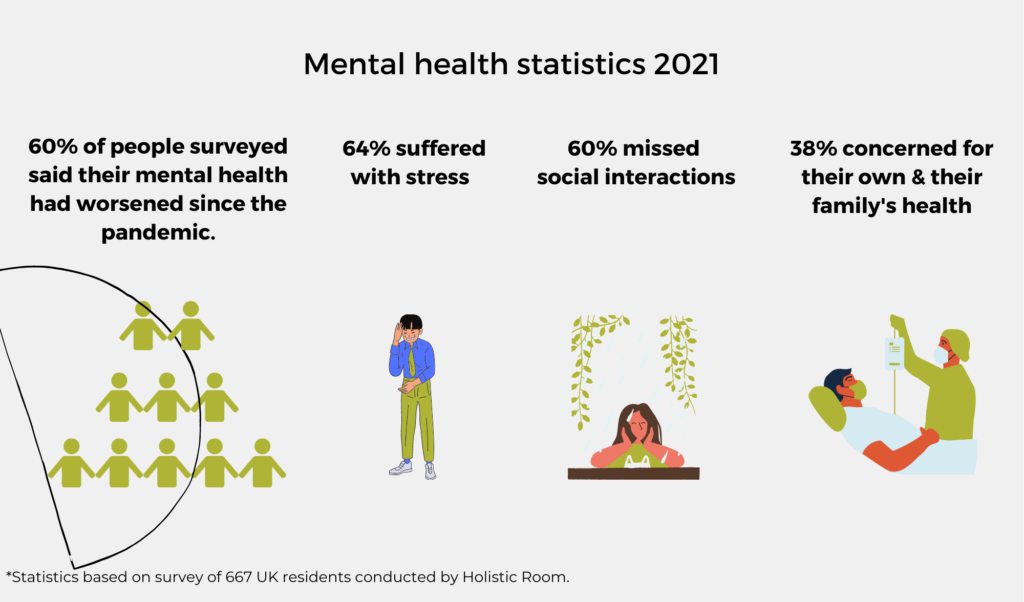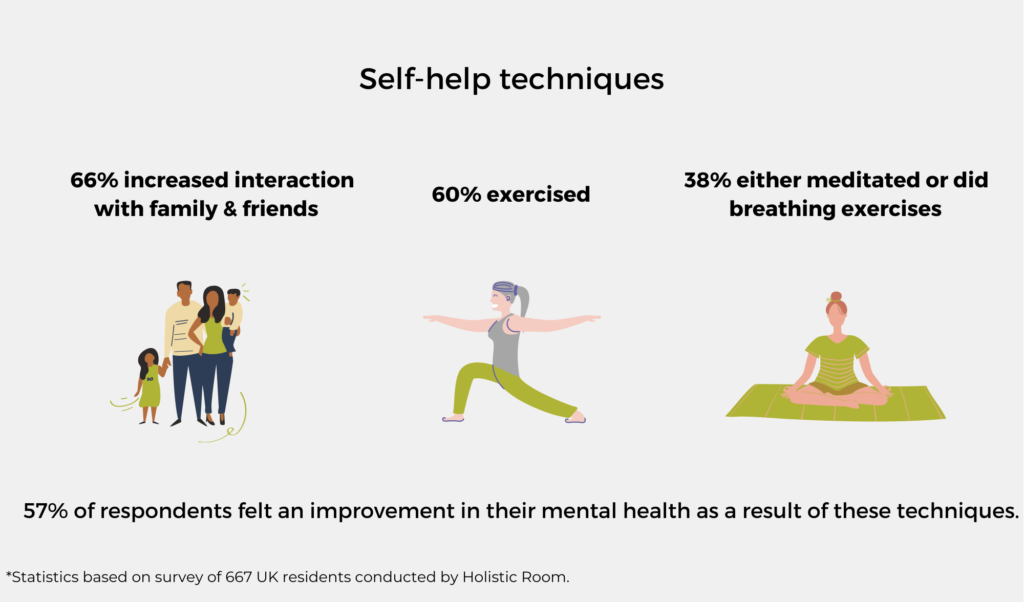
Can Self-Help Techniques Help to Flatten the Mental Health Curve?
It’s no surprise that recent research reveals that our mental health has taken a toll since the start of the pandemic. Stress about getting ill, job losses, family members’ health, in addition to feelings of isolation and loneliness has impacted many across the globe.
Even though there is light at the end of the tunnel, and we should be able to slowly start getting back to some normality over the coming months, it doesn’t mean an end to the mental health crisis we are seeing.
Current state of affairs
According to the Office for National Statistics (ONS), more than two-thirds of adults in the UK (69%) report feeling somewhat or very worried about the effect COVID-19 is having on their life. The most common issues affecting wellbeing are worrying about the future (63%) and 56% also reported feeling stressed or anxious.
Similarly, 842 people in the UK participated in a study during a 10-day period in April when the country had entered a national lockdown. Of the participants, 25% said that their anxiety and depression during lockdown got worse, and 37.5% met clinical criteria for generalised anxiety, depression or health anxiety.
Another study by the ONS in June 2020, found that almost one in five adults (19.2%) were likely to be experiencing some form of depression, indicated by moderate to severe depressive symptoms, during the pandemic. This has almost doubled from one in ten (9.7%) before the pandemic. 85% of those experiencing some form of depression felt their wellbeing was being affected by feelings of stress or anxiety.
A study conducted by Holistic Room consisting of 667 participants residing in the UK revealed that almost two-thirds (60%) said that their mental health has worsened since before the pandemic. The two biggest reasons were recorded as missing social interactions with family and friends (60%) and concerns around their own and their family’s health (38%). The top five symptoms felt since the start of the pandemic are anxiety (67%), stress (64%), overwhelm (44%), depression (41%) and fear (22%).
Other issues experienced during the pandemic and lockdowns are increased eating due to stress (47%), sleep problems (46%). 36% had increased cravings for sugar, processed foods and junk food and 33% suffered with headaches or migraines, with some stating this being due to increased screen time.
66% of people who took part in Holistic Room’s survey believe that the Government did not do enough to support people’s mental health during the pandemic. The most common suggestion on what action they believe the Government should have taken was around providing more funding towards mental health services, better communication and more clarity on how people can receive mental health support, such as sharing this information at the same time as delivering televised COVID-19 updates.

Utilisation of support
Holistic Room also reported that of those that didn’t take any action for their mental health worsening, 19% stated this was because they were too overwhelmed to take action or didn’t know where to start and another 19% believe it’s normal to have mental health issues during a time like this.
UK mental health charity Mind reported that people with mental health problems have been struggling to access the support they need in primary and crisis care. Even though many services turned to digital support, 1.9 million people do not have digital access. Many have fallen through the net during the pandemic and mental health services need to find ways to support them.
Consequences
The world was not set up to respond to the growing mental health crisis before the pandemic, and it is still not now. Despite the scale of the problems, funding is hugely lacking.
The Centre for Mental Health has worked with the NHS to build a model based on the best available evidence to forecast how many people may need mental health support as a result of the pandemic. It predicts that in England, up to 10 million people (almost 20% of the population) will need either new or additional mental health support as a direct consequence of the pandemic. The majority will need support for depression or anxiety or both.
Self-help techniques
Mental health is one of the biggest pandemic issues we’ll face in 2021. In addition, emerging data and numerous online support groups on the effects of long-covid, are making it more apparent that this will add to the mental health crisis long after the pandemic is over.
However, self-help techniques are having a positive impact on people’s mental health and clearer guidelines are needed on what we can do at home to support our mental health. Holistic Room reported that the top three actions people took to enact positive change were talking to friends and family (67%), either start doing, or do more exercise (61%) and either start to do or do more meditation or breathing exercises (40%). Of those that took action to improve the way they feel, 57% reported that the action taken helped with their mental health.
Taking a holistic approach can have a positive impact on both mental and physical health. In the first instance, basic guidelines should communicate about getting some exercise, receiving good nutrition from your diet and about getting enough quality sleep.
Regular self-care and maintaining connectedness are keys in building long-term resilience. In addition to finding ways to connect with loved ones, establishing and keeping up with a consistent routine can also help.

Other self-help measures that have soared in user numbers since the start of the pandemic are meditation apps. Revenue for the top 100 mental wellness apps rose from $771M in 2019 to a whopping $1.1B in 2020.There’s little doubt that the pandemic has accelerated the growth of this market as research has shown that meditation can help to alleviate mental health issues such as depression and anxiety.
However, self-help measures are not always the answer. If you are having persistent anxiety or feeling so low you are not able to function, always seek professional help, and get the support you need.


